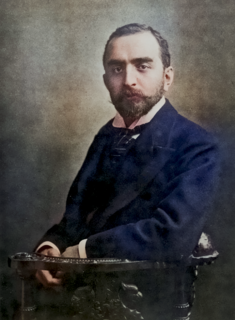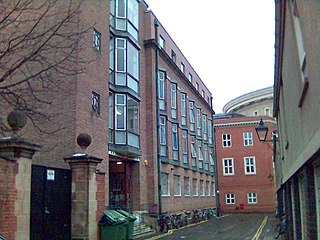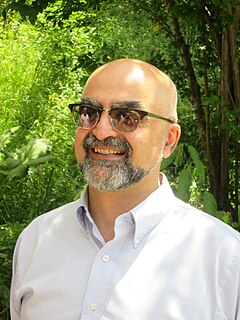Related Research Articles

Calouste Sarkis Gulbenkian, nicknamed "Mr Five Per Cent", was a British-Armenian businessman and philanthropist. He played a major role in making the petroleum reserves of the Middle East available to Western development and is credited with being the first person to exploit Iraqi oil. Gulbenkian travelled extensively and lived in a number of cities including Istanbul, London, Paris and Lisbon.

The Calouste Gulbenkian Foundation, commonly referred to simply as the Gulbenkian Foundation, is a Portuguese institution dedicated to the promotion of the arts, philanthropy, science, and education. One of the wealthiest charitable foundations in the world, the Gulbenkian Foundation was founded on 18 July 1956 according to the last will and testament of Calouste Sarkis Gulbenkian, a Portugal-based oil magnate who bequeathed his assets to the country in the form of a foundation.

The Nagorno-Karabakh conflict is an ethnic and territorial conflict between Armenia and Azerbaijan over the disputed region of Nagorno-Karabakh, inhabited mostly by ethnic Armenians, and seven surrounding districts, inhabited mostly by Azerbaijanis until their expulsion during the First Nagorno-Karabakh War. Some of these territories are de facto controlled, and some are claimed by the breakaway Republic of Artsakh although they have been internationally recognized as part of Azerbaijan. The conflict has its origins in the early 20th century, but the present conflict began in 1988, when the Karabakh Armenians demanded transferring Karabakh from Soviet Azerbaijan to Soviet Armenia. The conflict escalated into a full-scale war in the early 1990s which later transformed into a low-intensity conflict until four-day escalation in April 2016 and then into another full-scale war in 2020.

Holy Savior Cathedral, commonly referred to as Ghazanchetsots, is an Armenian Apostolic cathedral in Shusha in Azerbaijan, in the disputed region of Nagorno-Karabakh. It is the cathedra of the Diocese of Artsakh of the Armenian Apostolic Church. Standing 35 metres (115 ft) high, Ghazanchetsots is one of the largest Armenian churches in the world. A landmark of Shusha and the Karabakh region, and of Armenian cultural and religious identity, it is listed as cultural and historical monument of the breakaway Republic of Artsakh.

The Faculty of Asian and Middle Eastern Studies, is a subdivision of the University of Oxford.

United Armenia, also known as Greater Armenia or Great Armenia, is an Armenian ethno-nationalist irredentist concept referring to areas within the traditional Armenian homeland—the Armenian Highland—which are currently or have historically been mostly populated by Armenians. The idea of what Armenians see as unification of their historical lands was prevalent throughout the 20th century and has been advocated by individuals, various organizations and institutions, including the nationalist parties Armenian Revolutionary Federation and Heritage, the ASALA and others.

Şahan Arzruni is an Armenian classical pianist, ethnomusicologist, lecturer, composer, writer and producer, residing in New York City.

Armenia, officially the Republic of Armenia, is a landlocked country located in the Armenian Highlands of Western Asia. It is a part of the Caucasus region; and is bordered by Turkey to the west, Georgia to the north, the Lachin corridor and Azerbaijan to the east, and Iran and the Azerbaijani exclave of Nakhchivan to the south. Yerevan is the capital, largest city and the financial center.
There are roughly 1,000 Armenians currently living in Mainland China and Hong Kong.

The Armenian Patriarchate of Jerusalem also known as the Armenian Patriarchate of Saint James is located in the Armenian Quarter of Jerusalem. The Armenian Apostolic Church is officially recognised under Israel's confessional system, for the self-regulation of status issues, such as marriage and divorce.
Aram Ter-Ghevondyan was an Armenian historian and scholar who specialized in the study of historical sources and medieval Armenia's relations with the Islamic world and Oriental studies. His seminal work, The Arab Emirates in Bagratuni Armenia, is an important study on the Bagratuni Kingdom of Armenia. From 1981 until his death, Ter-Ghevondyan headed the Institute of Oriental Studies at the Armenian Academy of Sciences and he additionally held an honorary doctorate from the University of Aleppo and was an associate member of the Tiberian Academy of Rome.

Robert William Thomson was Calouste Gulbenkian Professor of Armenian Studies at Oxford University.
The Azerbaijani diaspora are the communities of Azerbaijanis living outside the places of their ethnic origin: Azerbaijan and the Iranian region of Azerbaijan.

Razmik Panossian is a Canadian-Armenian historian and political scientist.

St Sarkis is an Armenian Apostolic church and a Grade II* listed building in Iverna Gardens, Kensington, London. It was constructed in 1922–23 by Calouste Gulbenkian as a memorial to his parents, and the architect was Arthur Davis. It is the only church in England to have been built in the traditional Armenian style. Its design is inspired by the 13th century freestanding bell tower of Haghpat Monastery. It is the seat of the Diocese of the United Kingdom of the Armenian Apostolic Church.
The Armenian community of the United Kingdom consists mainly of British citizens who are fully or partially of Armenian descent. There has been sporadic emigration from Armenia to the UK since the 18th century, with the biggest influx coming after the Second World War. The majority are based in the major cities of London and Manchester. The 2001 UK Census recorded 589 Armenian-born people living in the UK, and in 2013, the Office for National Statistics estimated that there were 1,235 people born in Armenia resident in the UK, with the number of Armenian nationals being 1,720, although it has been estimated by the Armenian Diaspora Conference that there are up to 18,000 ethnic Armenians including those who are British-born, and of part Armenian descent, living in the UK.

Nina G. Garsoïan was a French-born American historian specializing in Armenian and Byzantine history. In 1969 she became the first female historian to get tenure at Columbia University and, subsequently, became the first holder of Gevork M. Avedissian Chair in Armenian History and Civilization at Columbia. From 1977 to 1979, she served as dean of the Graduate School of Princeton University.

The 2020 Nagorno-Karabakh war was an armed conflict in the disputed region of Nagorno-Karabakh and the surrounding territories. It was a major escalation of an unresolved conflict over the region, involving Azerbaijan, supported by Turkey and foreign mercenary groups, and Armenia, along with the breakaway Republic of Artsakh with an Armenian ethnic majority but internationally recognised as part of Azerbaijan.

Theo Maarten van Lint is a Dutch scholar of Armenian studies. He has been the Calouste Gulbenkian Professor of Armenian Studies at the University of Oxford and a professorial fellow of Pembroke College since 2002. In the past, he has also served as secretary of the International Association for Armenian Studies.
References
- 1 2 3 4 "Professor Hratch Tchilingirian". armeniancouncil.org. Social Democrat Hunchakian Party. Archived from the original on 27 May 2020.
- ↑ "Hratch Tchilingirian on Christianity in the Middle East Today". naasr.org. National Association for Armenian Studies and Research. October 30, 2019. Archived from the original on 10 September 2022.
- 1 2 "Hratch Tchilingirian". orinst.ox.ac.uk. Faculty of Oriental Studies University of Oxford. Archived from the original on 27 May 2020.
- ↑ "About Hratch Tchilingirian". c-r.org. Conciliation Resources UK. Archived from the original on 10 September 2022.
- ↑ "Hratch Tchilingirian (short bio)". oxbridgepartners.com. Archived from the original on 10 September 2022.
- ↑ "Dr. Hratch Tchilingirian Appointed Director of Armenian Diaspora Survey". gulbenkian.pt. Calouste Gulbenkian Foundation. 23 May 2019. Archived from the original on 10 September 2022.